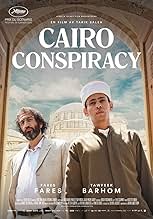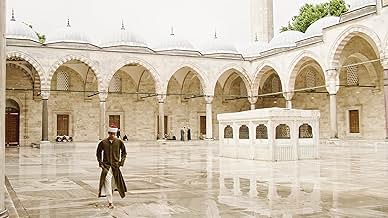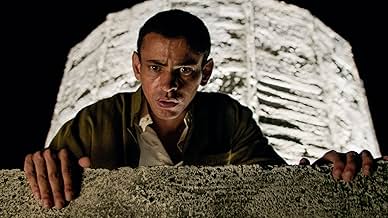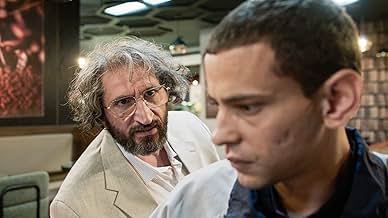Adam, filho de um pescador, recebe o privilégio de estudar na Universidade Al-Azhar no Cairo, centro do poder do Islã sunita. Adam se torna uma peça no conflito entre as elites religiosas e ... Ler tudoAdam, filho de um pescador, recebe o privilégio de estudar na Universidade Al-Azhar no Cairo, centro do poder do Islã sunita. Adam se torna uma peça no conflito entre as elites religiosas e políticas do Egito.Adam, filho de um pescador, recebe o privilégio de estudar na Universidade Al-Azhar no Cairo, centro do poder do Islã sunita. Adam se torna uma peça no conflito entre as elites religiosas e políticas do Egito.
- Prêmios
- 5 vitórias e 21 indicações no total
Mohammad Bakri
- General Al Sakran
- (as Mohamad Bakri)
Makram Khoury
- Blind Sheikh Negm
- (as Makram J. Khoury)
Ahmed Laissaoui
- Raed
- (as Ahmed Lassaoui)
Hassan El Sayed
- Village Imam
- (as Hassan El-Sayed)
Avaliações em destaque
If there are certain films that we consume and extract everything they want to tell us at the moment it ends, there are others that have much to explore and understand between the lines. Cairo Conspiracy - previously called Boy From Heaven, a much more suitable title - is a political and religious thriller with some very clear messages but also a lot to read and extrapolate.
The story is simple and seemingly contained. It tells us about a boy, Adam (Tawfeek Barhom), who receives a letter that will change his life: he has been accepted at the prestigious Al-Azhar University in Cairo, Egypt. As soon as he arrives, the Grand Imam of al-Azhar dies suddenly, and a power struggle to replace him begins. For someone with little knowledge of the culture in question and what this position actually represents - believe me, this is much more than a mere college dean in the US - it may seem strange why this is such a coveted place. Why do some people kill? Why do some people give their lives? I confess that when the film ended, I researched the topic a bit more, however, the film does a good job of showing us the importance of what we are talking about here, involving various religious fabrics - more or less dangerous - and the government itself. And where does Adam fit in? Well, Adam, who until then was little more than "the fisherman's son," finds himself involuntarily involved in the centre of these intrigues, conspiracies, and dangerous games.
Tawfeek Barhom - whom I did not know before - has a powerful interpretation as Adam. A young man who still needs to get to know himself but has little time to look at himself. He doesn't always do the right thing. He doesn't always know what to do. He doesn't always find it easy to express what he feels. He is a confused teenager, like any teenager, but he cannot afford to remain in that state for too long. He is forced to become a man. Right now.
Man. If there's one thing that this movie doesn't lack, it's men. It's almost impossible to see a woman in this toxic and patriarchal world. When any attention is given to a woman, it's to expose the way she's treated by society and the more powerful. It's to show us that she should remain without opinion, without identity, submissive and obedient to what life - men - enable her to do. I may be using a lot of words on something that isn't the central theme of this film, but I feel that Tarik Saleh's choice is intentional. Even when he shows us certain family environments of characters who should be dear to us, the writer and filmmaker gives us clues about what he thinks about the concept of family and how genders have well-defined roles within society.
Through this, we can also extract much of what this film wants to say about its central themes. We're talking about a society that merges with its religiosity. Everyone's roles converge with Islam, whether we're talking about a more radical or more open side of it. And when they diverge in the customs and teachings passed down by the written and spoken word, it invariably serves to expose all the hypocrisy of a system that only survives because it enables a few to dominate and control everything and everyone. When Saleh shows us daily hygienic rituals specific to religion, he shows us people cleaning themselves of all their sins, all their anxieties, and all their filth. The filth that leaves marks on the outside and the filth that leaves marks on the inside. And, no matter how much goodwill and people want to do better, there are always stronger forces that could take them down undesired paths, paths that don't represent what that - or any other - religion stands for on paper.
When it comes to power dynamics, Cairo Conspiracy is fascinating. It is so when it demonstrates the calculated relationships of those who know a lot about this life. It is even more fascinating when, gradually, it reveals who are, in fact, the main players of this game and who are their pawns. There are pawns for all tastes. This is particularly visible in the figure of the investigator we follow more closely - Ibrahim, very well portrayed, full of nuances by the already well-known Fares Fares - who has his own pawns and is also a pawn of someone else.
There are also other major pawns. Those who should not even be there. I'm talking about the students of that University who, on one side or the other of the board, have been used in power and backstage wars, being manipulated for personal purposes. This is also a way of keeping society the way it is, indoctrinating - grooming is the right word - from an early age, reaching those most susceptible and feeding the system itself.
Cairo Conspiracy may seem, at times, a cold film. It is a film with no completely right sides or characters doing what we are used to see in Hollywood heroes. But do not be fooled. When it criticizes the functioning of a society, it is not pushing us away from its people. It acknowledges the cynicism but also believes in individuals and the impact that small choices can have. It is not asking for war. It is shouting for help. It is shouting for change. The change of men.
The story is simple and seemingly contained. It tells us about a boy, Adam (Tawfeek Barhom), who receives a letter that will change his life: he has been accepted at the prestigious Al-Azhar University in Cairo, Egypt. As soon as he arrives, the Grand Imam of al-Azhar dies suddenly, and a power struggle to replace him begins. For someone with little knowledge of the culture in question and what this position actually represents - believe me, this is much more than a mere college dean in the US - it may seem strange why this is such a coveted place. Why do some people kill? Why do some people give their lives? I confess that when the film ended, I researched the topic a bit more, however, the film does a good job of showing us the importance of what we are talking about here, involving various religious fabrics - more or less dangerous - and the government itself. And where does Adam fit in? Well, Adam, who until then was little more than "the fisherman's son," finds himself involuntarily involved in the centre of these intrigues, conspiracies, and dangerous games.
Tawfeek Barhom - whom I did not know before - has a powerful interpretation as Adam. A young man who still needs to get to know himself but has little time to look at himself. He doesn't always do the right thing. He doesn't always know what to do. He doesn't always find it easy to express what he feels. He is a confused teenager, like any teenager, but he cannot afford to remain in that state for too long. He is forced to become a man. Right now.
Man. If there's one thing that this movie doesn't lack, it's men. It's almost impossible to see a woman in this toxic and patriarchal world. When any attention is given to a woman, it's to expose the way she's treated by society and the more powerful. It's to show us that she should remain without opinion, without identity, submissive and obedient to what life - men - enable her to do. I may be using a lot of words on something that isn't the central theme of this film, but I feel that Tarik Saleh's choice is intentional. Even when he shows us certain family environments of characters who should be dear to us, the writer and filmmaker gives us clues about what he thinks about the concept of family and how genders have well-defined roles within society.
Through this, we can also extract much of what this film wants to say about its central themes. We're talking about a society that merges with its religiosity. Everyone's roles converge with Islam, whether we're talking about a more radical or more open side of it. And when they diverge in the customs and teachings passed down by the written and spoken word, it invariably serves to expose all the hypocrisy of a system that only survives because it enables a few to dominate and control everything and everyone. When Saleh shows us daily hygienic rituals specific to religion, he shows us people cleaning themselves of all their sins, all their anxieties, and all their filth. The filth that leaves marks on the outside and the filth that leaves marks on the inside. And, no matter how much goodwill and people want to do better, there are always stronger forces that could take them down undesired paths, paths that don't represent what that - or any other - religion stands for on paper.
When it comes to power dynamics, Cairo Conspiracy is fascinating. It is so when it demonstrates the calculated relationships of those who know a lot about this life. It is even more fascinating when, gradually, it reveals who are, in fact, the main players of this game and who are their pawns. There are pawns for all tastes. This is particularly visible in the figure of the investigator we follow more closely - Ibrahim, very well portrayed, full of nuances by the already well-known Fares Fares - who has his own pawns and is also a pawn of someone else.
There are also other major pawns. Those who should not even be there. I'm talking about the students of that University who, on one side or the other of the board, have been used in power and backstage wars, being manipulated for personal purposes. This is also a way of keeping society the way it is, indoctrinating - grooming is the right word - from an early age, reaching those most susceptible and feeding the system itself.
Cairo Conspiracy may seem, at times, a cold film. It is a film with no completely right sides or characters doing what we are used to see in Hollywood heroes. But do not be fooled. When it criticizes the functioning of a society, it is not pushing us away from its people. It acknowledges the cynicism but also believes in individuals and the impact that small choices can have. It is not asking for war. It is shouting for help. It is shouting for change. The change of men.
10theowest
Why the name change?
Anyway, the experience was absolutely beautiful. Seeing this at the premiere in Sweden where the director/writer Tarik Saleh could further explain his personal motivations and ideas around the story just made it so much special and as a Swede, I'm happy to see the culture of my Arabic neighbours being represented in such a masterfully crafted way. I could get the vibe of how a western film tells a story but also delve deep into a trance-like state for what family, tradition, symbolisism and religious perspectives and experiences are like.
The genre is of the captivated and serious kind, but also of the holy, which suits its original film title. Great casting, cinematography, pacing and story. I thoroughly enjoyed this movie.
I hope to see a lot more cultural representation from the middle east and collaborations in Sweden in the future. This might just be a really good taste of what's to come.
Anyway, the experience was absolutely beautiful. Seeing this at the premiere in Sweden where the director/writer Tarik Saleh could further explain his personal motivations and ideas around the story just made it so much special and as a Swede, I'm happy to see the culture of my Arabic neighbours being represented in such a masterfully crafted way. I could get the vibe of how a western film tells a story but also delve deep into a trance-like state for what family, tradition, symbolisism and religious perspectives and experiences are like.
The genre is of the captivated and serious kind, but also of the holy, which suits its original film title. Great casting, cinematography, pacing and story. I thoroughly enjoyed this movie.
I hope to see a lot more cultural representation from the middle east and collaborations in Sweden in the future. This might just be a really good taste of what's to come.
Tarik Saleh put his hand on a timeless aspect of Egyptian politics: the power interplay between the political leaders (the military) and the religious figures (Al Azhar). Never has this sensitive issue been addressed before. Which is ironically the very reason why this movie fails.
The reason why this issue was not addressed by Egyptian cinema (or "Hollywood-sur-Nil" as some used to call it back in its glamorous days) is simple: censorship. Egyptian moviemakers and actors would not be allowed to talk about this taboo. Indeed, this movie will not be played in Egyptian cinemas.
The direct consequence is that only foreign moviemakers can get away with making a movie that tackles this sensitive issue. And this is where things go wrong.
The movie - understandably - fails to capture any Egyptian essence. Dialogues are unnatural. Characters and attitudes are artificial. Add to this the fact that the cast is virtually Egyptian-free (for the reasons described above). They are therefore incapable of smoothing the dialogues into something that feels more natural.
While Tarik Saleh is from Egyptian descent, it is obvious from this movie that his relation to Egypt is, alas, too tenuous to make a movie that delves so deep into Egyptian social, political and religious realities.
Nevertheless, I am aware that my issue with this movie will only be shared by the Egyptian public. Therefore, to the extent that Tarik Saleh considers Boy from Heaven to be a a picture about Egypt by foreign filmmakers to foreign viewers, I would cut him some slack.
Still, the movie is riddled with espionnage clichés. Whichever you can think of, you will find in Boy from Heaven. Egyptian classical music is played at unlikely places. Scene transitions are often abrupt, evidencing issues with the montage.
More than once, the movie did feel like an average film school student's graduation project.
The reason why this issue was not addressed by Egyptian cinema (or "Hollywood-sur-Nil" as some used to call it back in its glamorous days) is simple: censorship. Egyptian moviemakers and actors would not be allowed to talk about this taboo. Indeed, this movie will not be played in Egyptian cinemas.
The direct consequence is that only foreign moviemakers can get away with making a movie that tackles this sensitive issue. And this is where things go wrong.
The movie - understandably - fails to capture any Egyptian essence. Dialogues are unnatural. Characters and attitudes are artificial. Add to this the fact that the cast is virtually Egyptian-free (for the reasons described above). They are therefore incapable of smoothing the dialogues into something that feels more natural.
While Tarik Saleh is from Egyptian descent, it is obvious from this movie that his relation to Egypt is, alas, too tenuous to make a movie that delves so deep into Egyptian social, political and religious realities.
Nevertheless, I am aware that my issue with this movie will only be shared by the Egyptian public. Therefore, to the extent that Tarik Saleh considers Boy from Heaven to be a a picture about Egypt by foreign filmmakers to foreign viewers, I would cut him some slack.
Still, the movie is riddled with espionnage clichés. Whichever you can think of, you will find in Boy from Heaven. Egyptian classical music is played at unlikely places. Scene transitions are often abrupt, evidencing issues with the montage.
More than once, the movie did feel like an average film school student's graduation project.
If you are not Muslim, chances are you never heard about Al Azhar, which is a university teaching the Islam Sciences since 970 in Cairo, Egypt. They are the ones electing the Great Imam, and have been fully independent from the government since the very beginning. Governments have tried to get into it for centuries, to no avail. The movie starts with the Great Imam dying, and the government's attempt to choose who will be the next one, preferably on the government's side. You follow Adam, a young man who just arrived from his small village to learn about Islam. He gets involved in a situation that gets worse with every decision he makes, but he somehow still continues to learn about Islam between his investigations, prayers, and lack of sleep. He seems like a very pious guy, not understanding what he is getting himself into, and looks lost most of the time. The movie is a bit slow however, and could have used a bit more rhythm or maybe just to be shorter.
This movie has shaken Egypt to its very core, it has been deemed so provocative that it is BANNED. The director is Egyptian, the move is set in Cairo (yet filmed funnily enough in Istanbul because of the ban). It has yeilded award in the Cannes film festival, and it is simply put SUPERB.
The camera is well used, the atmosphere build up is immensely satisfying. And it ultimately proves the old saying "Man will be free when the last King has been strangled with the last priests entrials"- This is a CULT movie in the making. Unfortunately you will never see this film in Egypt.
The camera is well used, the atmosphere build up is immensely satisfying. And it ultimately proves the old saying "Man will be free when the last King has been strangled with the last priests entrials"- This is a CULT movie in the making. Unfortunately you will never see this film in Egypt.
Você sabia?
- CuriosidadesA few days before the shooting in Egypt for The Nile Hilton Incident (2017) was supposed to take place, director Tarik Saleh was publicly removed from the country and told not to come back. As a result, that movie was shot in Casablanca, Morocco. As he's still persona non grata in Egypt, he couldn't shoot Garoto dos Céus (2022) there, thus despite being set in Cairo, the film was actually shot in Istanbul, Turkey, mostly in the Süleymanye mosque.
- ConexõesFeatured in Il était une fois...: La conspiration du Caire (2024)
Principais escolhas
Faça login para avaliar e ver a lista de recomendações personalizadas
- How long is Cairo Conspiracy?Fornecido pela Alexa
Detalhes
Bilheteria
- Orçamento
- € 6.500.000 (estimativa)
- Faturamento bruto mundial
- US$ 4.867.691
- Tempo de duração
- 2 h 6 min(126 min)
- Cor
- Mixagem de som
- Proporção
- 2.39 : 1
Contribua para esta página
Sugerir uma alteração ou adicionar conteúdo ausente





























